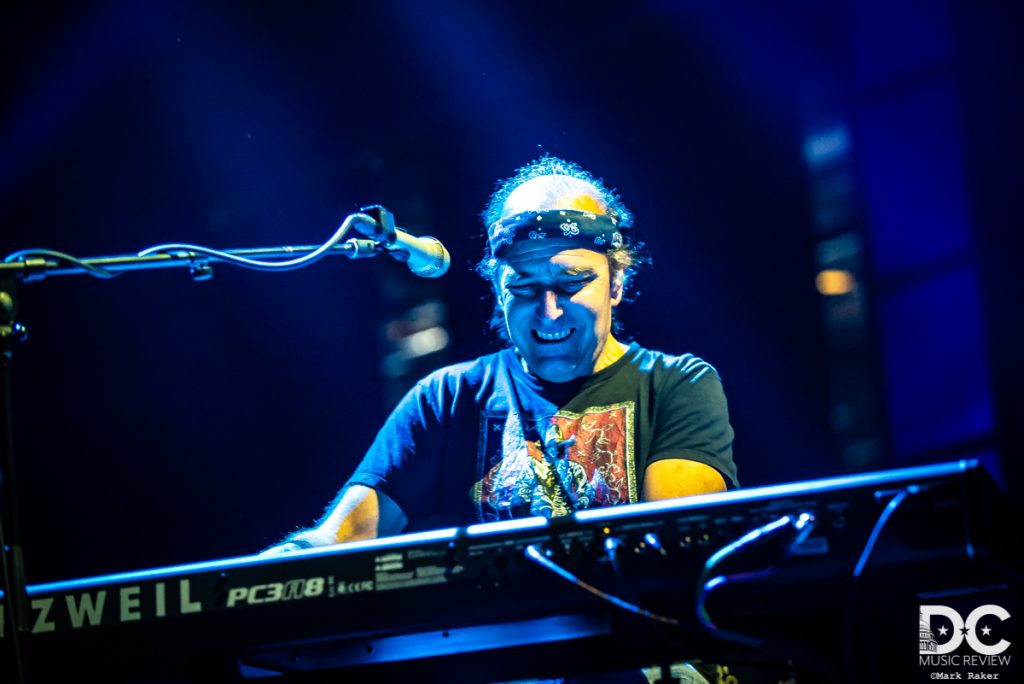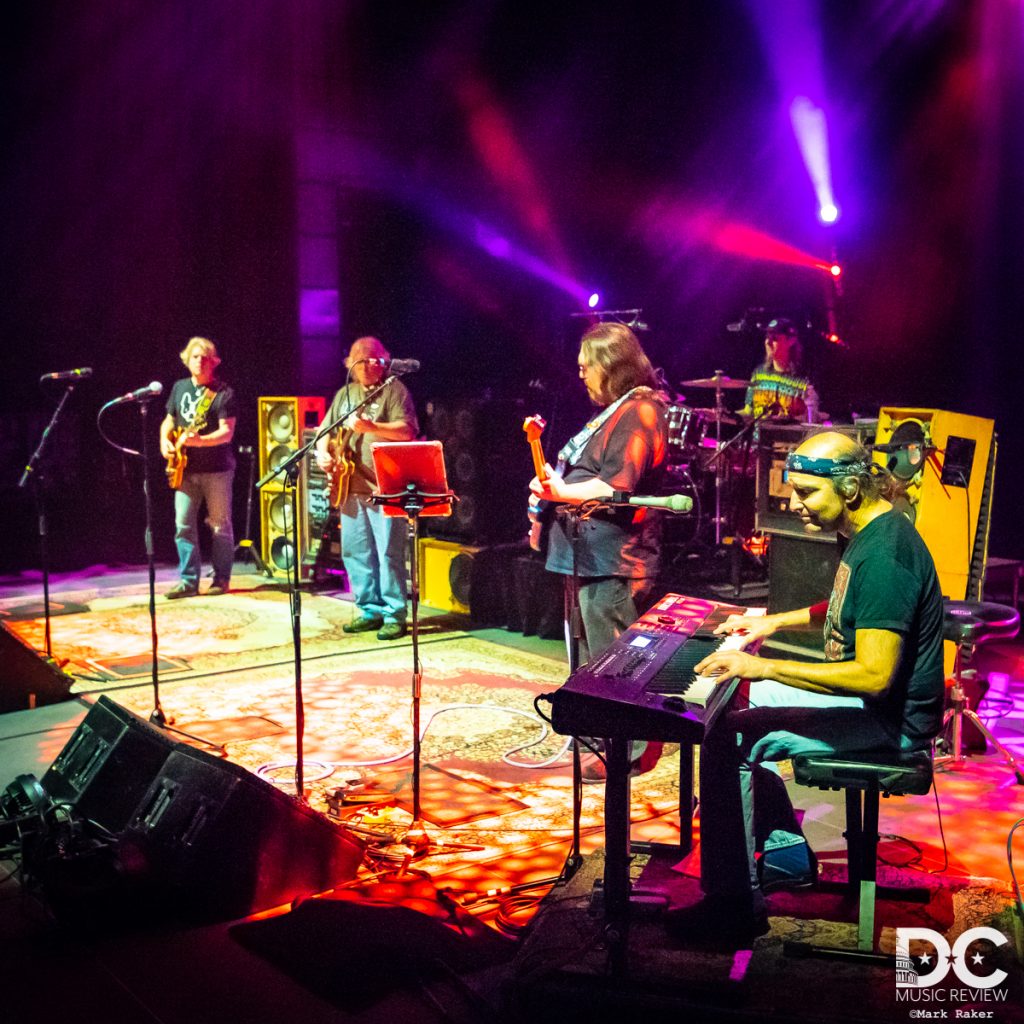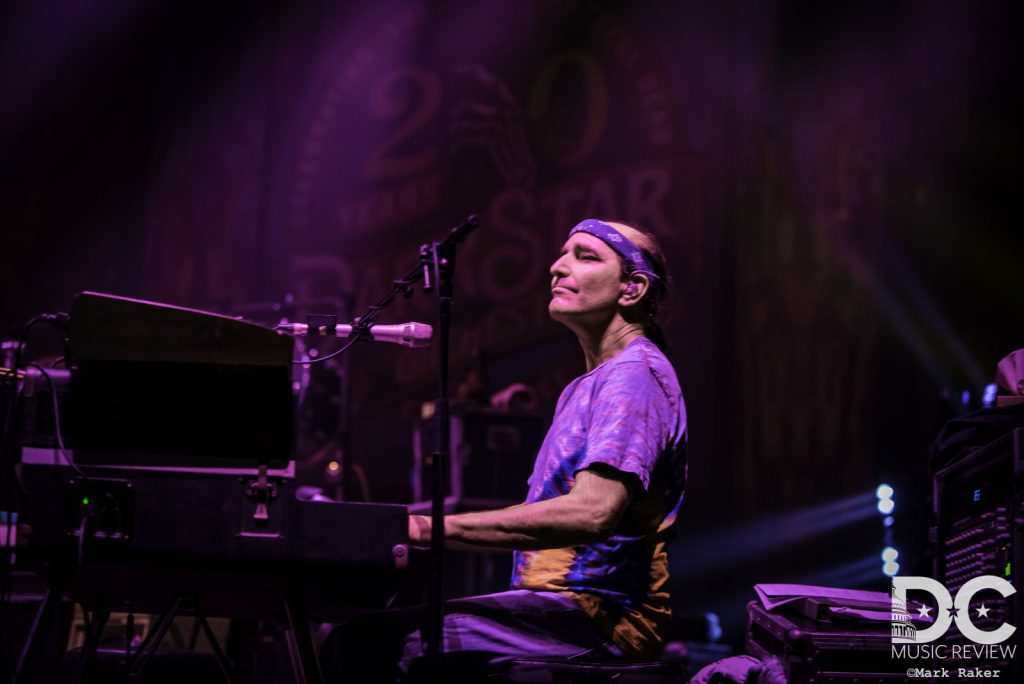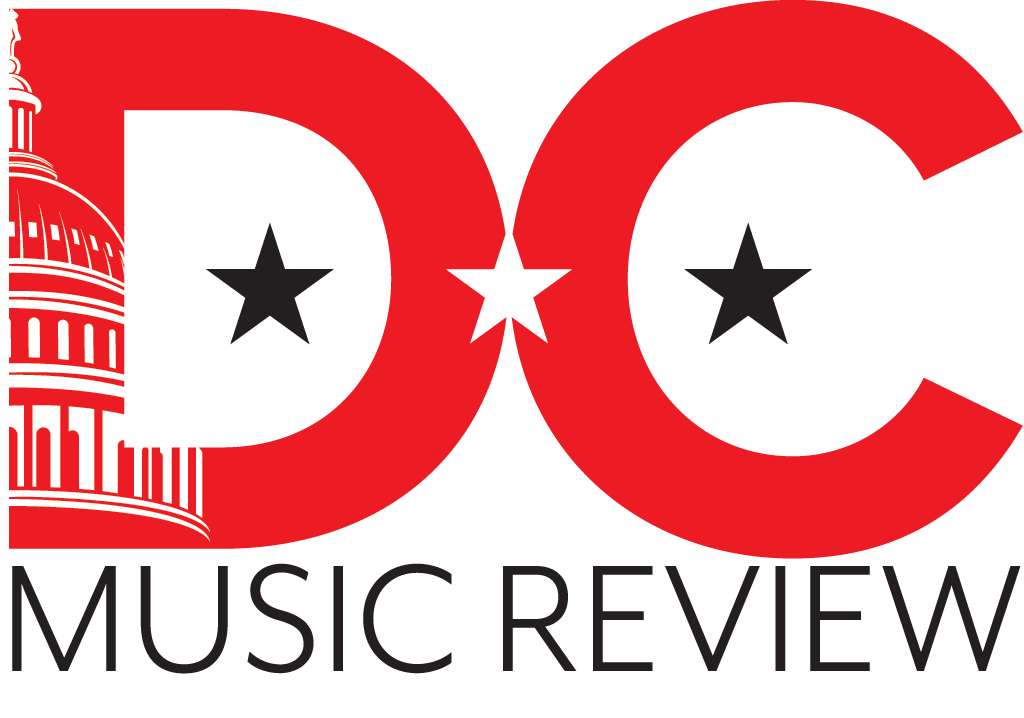Dark Star Orchestra has been playing for over 20 years and has performed close to 3000 shows. They're back on the road as the trip of life continues and we got to speak with keyboard player Rob Barraco ahead of their two-night run at The Hamilton in D.C.
Karin McLaughlin: You've been doing music in the realm of Grateful Dead in many different respects for a very long time. I also read that you started out as a keyboard and a guitar player, is that correct?
Rob Barraco: Well, my first foray into music was when I was little, I think I started playing guitar when I was six. So I played for about five years and then when I was 11, my father convinced me - he always wanted a theater organ in the house, nobody could ever figure out why, but he loves to sing. He was a really good singer, he was a terrible musician though, no time - my mother used to have to conduct him, you know. He bought a theater organ and I learned how to play and I took to it right away. In retrospect, I wish they bought me a piano, because ultimately, in college when I was 19, I switched to piano. I was a classical organ major and it was driving me crazy, I couldn't figure out 'What am I going to do with this skill, play in the church?'
KM: (laughs) That's what I was going to say!
RB: I was like, well, piano is so universal and plus, I also had gotten turned on to a jazz pianist and I was just so enamored and that's really what I wanted to do. So I became a pianist at 19 and I've never looked back. I've always loved playing guitar. I learned how to play bass through listening to the Grateful Dead, so I learned how to play a little bit like Phil Lesh, which did not serve me well because I tried to be a bass player in a couple of bands and they looked at me like, 'What are do you doing?' I would say, 'I'm playing bass' and they'd say, 'Uh, no you're not, that's not bass.' I went, 'Sure it is!' and they'd say, 'No, we want you to do this,' and I was thinking, 'Wow, that's dumb, it's not very interesting.' (laughs) Yeah, I love playing bass, it's such a great instrument, but piano is my thing.
KM: So you could honestly start pretty much a one man band, right? (laughs)
RB: (laughing) Yeah, on tape I could.
KM: You mentioned that you were a big jazz guy. I can't remember what article specifically I was reading, but it said that you were a big Grateful Dead fan and then you stopped listening to them for a while because all you wanted to hear was jazz.
RB: Yeah, that happened when I was about 21. I saw most of my Grateful Dead shows in 1972 and in about 1978, I went to a couple of shows and I noticed that the music just wasn't being played at the same level, at least to me it wasn't. That also coincides with when I started to go see the jazz artists that I was really enamored with at the time. Those guys play at such a high level and it's so intense. They were taking me to that place that the Grateful Dead used to take me to and no longer were. Why would I want to go see Grateful Dead when I could go see these guys? They were playing at a level that gave me something to shoot for, you know, to aspire to and I wanted to do something that was a real challenge. Even to this day, jazz is a huge challenge for me and I love it.
KM: So you built up your Grateful Dead tolerance to a point where you had to switch to some other substance?
RB: (laughs) Yeah and I never looked back. The problem was that trying to make a living as a jazz artist is just nearly impossible. I mean I was married, I had two kids, there was no way that I was going to be able to afford, even with with with my ex working, I wasn't bringing in enough money. I had to resort to playing weddings, but I kept getting calls from Grateful Dead bands, because they knew that I knew the repertoire and so I kept getting sucked into these bands. It was cool because I could utilize all my jazz knowledge in the improvisational part of doing the Grateful Dead thing.


KM: You mentioned two kids, your son is a musician as well, correct?
RB: Yeah, he is a drummer. He's a great, amazing musician, he really is. He and I play with some of the guys from DSO. We have a side project doing our lead guitar players music and other stuff, it's called Jeff Mattson and Friends. My son Tom is the drummer of that band. My daughter was actually a tremendous pianist when she was young, her teacher thought she would go to Juilliard and do the whole thing. Then when she turned about 12, she became huge social butterfly and that was the end of that, because she didn't want to practice anymore. You know, you can't force that discipline on somebody, they have to want it and she didn't, but she went on to become a very successful attorney.
KM: Did she ever admit that she wishes she had stuck with it?
RB:Yes. She called me when she was in college and she goes, 'Why did you let me quit?' I was like, oh yeah blame me for everything (laughs). She can still play beautifully though when she does sit down in front of a piano.
KM: Speaking specifically about Dark Star and what you guys do with your shows - you want to recreate not only obviously, when you do a specific show with setlist, you're also trying to recreate the feeling of the Dead show and the experience. How do you convey that to the fans? I mean, obviously people that have been in attendance at actual Dead shows and they come to your shows, they know what it's about. But there's a ton of new people, the people that were attending the Dead shows in the 60's and 70's are bringing their kids to these Dark Star shows or JRAD or other cover bands that play the Grateful Dead music. You even see, especially in the jam grass and even non jam grass scene, you have everybody covering Dead. How do you give that feeling to people that never felt it in the first place?
RB: Well, the number one aspect of this music is the improvisational nature, every note is made up. So even though we're recreating a show from a specific era, we're very conscious of the arrangements of the tunes in those eras, the tempos of the tunes, even the instruments that they use to get the sounds that they were getting. After that, when the show starts, it's all improvised and that's the thing that I think turns Deadheads into Deadheads. Once they grasp that, they're in for life because they start to realize they can see that band every night and it's going to be a different experience.
When we were seeing the Dead in the mid 70s. Every show they played almost the same songs, because they didn't have an expansive repertoire at that time and we didn't care, right because it was all different every night. So at the end of the tour, we can compare, and say, 'Man that "Estimated Profit" on 5/11 was the best one of the bunch, because they did this and they did this and then the one on 5/15, it wasn't quite as long.' You know what I mean?
It's all about the improvisation and the musical conversation that the musicians have with each other. We're taking each other on a journey and the benefit of that, is the audience gets taken on the same ride. It 's a journey of surprise, because we don't know where it's going to end up. We're as surprised as they are where we go and sometimes it works, sometimes it doesn't.
The one good thing about Dark Star, I can honestly say we never fail. I've been to Dead shows, especially the latter day Dead shows where it was miserable failure and a lot of that was drug induced, just not caring. We approach the music with such enthusiasm that even when we don't make a 100% connection, it's still going places.


On top of that, every night for us is completely different because we make sure that if we do a '77 show tonight, tomorrow night could be an '89 show, or it could be a '69 show and it's a completely different animal. We do it on purpose, because we want to make it so a it's different for us to keep us interested and be different for the folks that are actually touring with us because we have a bunch of people on tour that go to all the shows. Like Tonight, we're in Boston. So we look at the list that we played the last four years and we make sure that we're playing something different. Dino English, one of our drummers is the one doing the setlist and it's a really daunting job because he has to create an entire tour and make sure that all those things are served. I could never do it, I would never have the patience.
Then about every third or fourth show, we put together our own set list -we call it an elective set. That gives us the ability to maybe juxtaposition tunes that the Dead never really put together which makes it really interesting for us. We can also cross pollinate eras in those shows. Also when we do the elective sets can draw on Garcia Band repertoire and Bob Weir's repertoire.
"There's so many different aspects to a musical performance, but all those perfect nights where the sound comes together and the music is playing the band as they say, it's magic. It just takes you away and you wake up out of it like, 'How'd we get here?'"
KM: So what is your personal favorite era to play?
RB: I love the one drummer shows and the reason is, when you get into the jams, you can go to all these crazy exotic places and you can turn on a dime with one drummer. When you have two drummers, it's not as easy. Phil Lesh, when I was working with him, he said it's like the difference between driving a Ferrari or driving a freight train. A Ferrari, you can turn on a dime and a freight train you have to just motor through. So those are the those are the ones that are my favorites.
When the music starts, truly doesn't make a difference to me, because I get sucked in so hard that by the time it's over, I'll look up basically look up and go, 'It's over? We just played three and a half hours?!' Of course, you know, every night is different - some nights I really get sucked in and some nights, it's more of a struggle. I mean, connecting with my instrument, me not connecting with my band mates. There's so many different aspects to a musical performance, but all those perfect nights where the sound comes together and the music is playing the band as they say, it's magic. It just takes you away and you wake up out of it like, 'How'd we get here?' Truly that's the feeling I used to get one I used to go to Dead shows when I was really into it. When it's over it feels like five minutes.
KM: So you guys are clocking over 20 years, I think close to 3000 shows, you have your own festival so let's talk about that. What's something that's really unique and special about that opportunity, as opposed to going on tour and being able to play all these cities and venues as opposed to being able to stay in one place and really get your feet set in a location with the same people and you're able to call it a Dark Star event?
RB: So the first event we put together was the Dark Star Jubilee, we started that in 2012 and it was such an honor to be able to put on your own festival. I'm very thankful to our manager, Tim Walter, who really was the one who pushed us to do it, he's the one who took the financial burden in the beginning. The beauty of that type of event is a you know, when we're on tour, we never get to see anybody else play music. So here we are, we're hand picking the bands that we want to come to our festival and we get to actually see all this different music, we get to interact with all these musicians, we get to play. That's a beautiful thing for musicians, you know? That's part of the growing process as a musician to be able to play with other musicians.
We've cultivated the festival now, to the point where, we're getting around 4000 people and that's the magic number, we don't want it to get any bigger than that, because it's a perfect festival. It's kid friendly, the camping scene is great, the cops don't really hassle anybody, we don't have the crazy drug element in there, at least not too bad (laughs). It really is beautiful - as long as the weather cooperates. You know, the first year we did it, we did it on Labor Day weekend, and Ohio had its one and only hurricane blow through and it swamped the fairgrounds. Couldn't even use the main stage, we had to do it on a little, tiny stage, but we made it work. Then the second year we did it, we decided to move it to Memorial Day weekend where we wouldn't have to contend with hurricanes. How about 30 degrees? I've never played when it's that cold out - you're outside, it's 35 degrees, the wind is howling, I mean it was rough! Ever since then, except for occasional thunderstorms rolling through, we've had some great weather - knock on wood.


So then our next our next adventure was Tim said, "How would you guys like to do a festival in Jamaica?" And we're like, "Yeah, who wouldn't?!" So that became Jam in the Sand and it's the same concept but much smaller scale. There's 300 to 500 people who will come and stay in all inclusive place, we play three nights on the beach and we have support, you know, we'll have two other bands play with us. This year, we've got the JGC with Melvin Seals and Donna the Buffalo. We've had Donna the Buffalo before and it's worked beautifully. They're like a Zydeco Cajun thing. Then of course, Melvin - my jaw hits the floor every time I see him play. If I was ever was going to just become an organ player again, that's what I aspire to be, like Melvin on the organ. I love the sound of the instrument and I love the way it feels, but I'll never play like Melvin. Melvin is out of the church, you know, and he goes to church every night.
KM: And takes everybody with him. (laughs)
RB: (laughing) Yes, he does. SANCTIFY! I love him and so that great. This year, we're going to do our Jubilee in Asheville, North Carolina. Two days. It's not a camping festival, but there's plenty of camping in the area and we'll see how that goes. People seem pretty enthused and my other band called California Kind is playing at it, so I'm excited about that.
KM: I want to do some rapid fire. Okay, you ready for this?
RB: Ready!
KM: What do you think this the song that you played the most over the years is?
RB: "China Cat Sunflower"
KM: What's your favorite song to play?
RB: "Dark Star".
KM: What about to hear?
RB: "Dark Star".


KM: Who's your favorite original Grateful Dead band member?
RB: Phil Lesh
KM: What is the best or most favorite sit in that you have ever done with a band?
RB: Sitting in with the Allman Brothers for the first time at the Beacon Theater.
KM: (laughing) I think I read the story about that - you got warned about breaking the bench, right?
RB: Yes (laughs) Gregg (Allman) tapped me on the shoulder and said, "That was good, except one thing." Oh my god, I was so embarrassed. I must have sat in with them a dozen times and every time I sat in with them after that, until they moved the keyboard over the other side of the stage, I would have to share his bench and I would move just my arms and my fingers. (laughs)
KM: That's hilarious! What about the favorite sit in that you guys have had for Dark Star?
RB: Phil Lesh.
KM: Ok can you possibly somehow describe a Dark Star Show to someone that's never heard of the Grateful Dead in five words.
RB: Woooooooow. Psychedelic, improvisational, jazzy, rocked out music (laughs).
KM: There you go. You did it. That's pretty good.
This interview has been edited and condensed for clarity and length
Performance Details
Performance Details
Performance
Details
Monday, May 13, 2019
Doors: 6:30PM
Show: 8:00PM
The Hamilton
$38.50 - Bar Area / Pit
Tuesday, May 14, 2019
Doors: 6:30PM
Show: 8:00PM
The Hamilton
$38.50 - Bar Area / Pit




